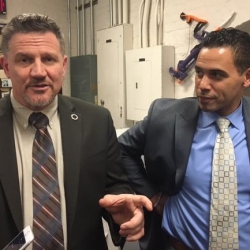
Kevin Brown and Rodney Butler both expressed confidence the Indian Bureau would not revoke the gaming compact.
The Mashantucket Pequot Tribal Nation and the Mohegan Tribal Gaming Authority continue to make concessions in order to secure approval for a third casino in Connecticut. This week, the two pledged to continue slots revenue payments even if the federal government alters or invalidates their current gaming compacts.
Connecticut lawmakers are concerned that granting the two Native American gaming authorities the right to build the MMCT Venture’s East Windsor casino might lead the US Department of the Interior’s Bureau of Indian Affairs to revoke the existing compacts. If that happened, the state treasury would lose an estimated $267 million a year in slots revenue payments.
Compact Stipulates 25% in Slot Revenues
At present, the tribes pay 25% of their slot revenues generated at Foxwoods Casino and Mohegan Sun to the state of Connecticut.
Last month, Connecticut Attorney General George Jepsen said he was concerned that the Bureau of Indian Affairs might alter the gaming compact if the two tribes received permission to open a third casino in the state.
The Mashantucket Pequot (Foxwoods) Tribe and the Mohegan Tribe have been rivals in the Connecticut casino industry for decades, but they agreed to a joint venture for a Hartford-area casino in order to keep Hartford residents gambling in their casinos, instead of the MGM Springfield casino 30 miles down the road.
For their part, the tribes have expressed confidence that the Bureau of Indian Affairs will approve of the third casino. The East Windsor development will not be built on tribal lands, so it is going to be a private casino, which might raise eyebrows with the Indian Bureau. Both tribes have other gaming interests outside Connecticut, though, so the tribes appear confident no alterations will be needed.
Rodney Butler: “Never Have Revoked a Compact”
To back up that confidence, the tribes have agreed to continue the current level of payment, whatever happens. Rodney Butler, Chairman for the Mashantucket Pequot Tribal Nation, said that the Bureau does not have a history of arbitrary decisions on gaming compacts.
Butler told the Hartford Courant, “In the history of the Bureau Of Indian Affairs, they never have revoked a compact.”
When the Hartford-area casino was suggested, the two tribes appeared to hold all the proverbial cards. The state legislature approved a casino with relatively little debate. MGM Resorts filed a lawsuit claiming they were not given a fair hearing when they inquired about a casino license in Bridgeport, but no one expected the lawsuit to lead to anything. Most saw it as a stalling tactic which might allowed MGM Resorts to finish the casino in Springfield before a Hartford casino could be built.
Hartford Residents Want Open Licensing Process
In recent months, though, Hartford-area residents began to lobby for the right to have an open licensing process. Rivalry between Hartford suburbs meant that residents in communities near East Windsor wanted their own legitimate shot at a casino.
If licensing was opened to others besides the two Connecticut tribes, though, it would allow operators like MGM Resorts to get back into the game. The tribes would face competition from Las Vegas casino companies with tons of cash to spend on developments. They might not win the bidding on such projects, so it is a good idea to obtain a quick decision from the Connecticut legislature.
Kevin Brown Confident in Indian Bureau
Thus, the Foxwoods and Mohegan tribes are willing to make concessions. As Rodney Butler stated, the chances the tribes will have to follow through on their promises are small.
Kevin Brown, the Mohegan Tribal Gaming Authority’s chairman, seems to agree with Rodney Butler. Mr. Brown told the Hartford Courant, “It’s slim to none, the chances that [the Bureau Of Indian Affairs] would rule in a way that would be against what we are trying to do.”
State Treasury’s Budget Issues
The assurances likely will have an effect on Connecticut officials. The state treasury is facing a budget crunch, so the loss of a quarter billion dollars of funds would be a particular disaster. If the state treasurer faces no risk of a loss of slot revenues, then lawmakers and administration officials are more likely to support the quick-and-easy route of the East Hartford casino.
The satellite casino is needed by the tribes, who faced a more fragmented regional casino gaming industry than they did even 10 years ago. When the Global Recession hit, both Foxwoods and Mohegan Sun had invested large amounts of cash in renovations and expansions. That has left each casino operation with more than $2 billion in debt apiece, at a time when the American northeast is starting to fill up with new casinos.
New York State approved four new casinos in the last few years, including Del Lago Resort, Finger Lakes, and Resorts World (Montreign). Massachusetts approved Wynn Boston Harbor and MGM Springfield, which are both integrated casino-resorts. The end result is Foxwoods and Mohegan Sun can expect far fewer gamblers from Boston and New York City. While that is unavoidable, Connecticut’s lawmakers approved a satellite casino to keep the state’s gamblers spending their money inside Connecticut.
